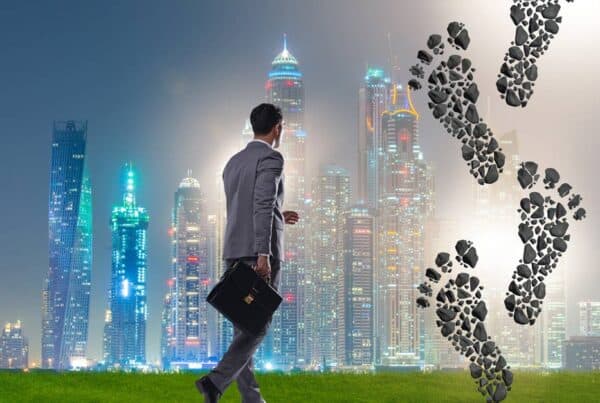Trends to watch for commercial building owners, property managers, and facility managers
Since the pandemic, there have been significant changes across social, economic, and political spheres. The property management industry was not left behind in the sweeping changes from the last two years. Property managers are being forced to keep up with the fast-changing regulatory landscape alongside the growing supply chain and labor shortages.
Clients and tenants also have higher expectations from facility management, which is driving the trends industry analysts expect to dominate the sector in 2022. So how will these trends impact property managers, facility managers, and building owners for commercial properties?
Read on for some of these trends.
1. Sustainable Buildings
According to Architecture 2030, the buildings sector contributes about 40% of global carbon emissions. This sector also contributes to 70% of emissions in urban areas. This has pushed the need and expectation for commercial real estate managers and stakeholders to integrate sustainability into their operations.
Thanks to the growing momentum towards protecting the planet from the adverse effect of emissions, commercial property managers, facility managers, and building owners are now prioritizing sustainability as a critical issue for focus.
Investors are also evaluating real estate investments based on ESG (Environmental, Social, and Governance) criteria. As pandemic and climate-related disruptions continue to have dramatic impacts on commercial real estate, investors are incorporating ESG criteria into every stage of the property lifecycle- from acquisition to leasing to asset management.
There is also a growing consumer awareness of the lack of accountability on ESG commitments; thus, the new breed of consumers is more likely to call out facility managers who do not comply with sustainability requirements.
Consumers, especially the millennial generation, are essential to this evolution toward sustainable practices and policies in commercial building ownership, property management, and facility operations.
As millennials become a dominant influence in the workforce and decision-making positions, focusing on reduced carbon footprint and sustainability becomes even more significant for commercial building owners and managers.
Therefore, the commercial real estate sector will have to adopt sustainable building policies and practices for commercial buildings to attract and retain tenants.
Governments are also creating rules, regulations, and policies for the real estate sector to ensure that builders, contractors, facility managers, and other stakeholders meet ESG goals.
Some of the steps facility managers can take to become more sustainable include:
- Conduct regular energy audits to pinpoint areas of energy wastage. These audits will inform repair, maintenance, and replacement decisions.
- Update your facilities to improve their energy efficiency. When updating a building, some of the focus areas include HVAC units, boilers, introducing renewable energy sources, using green roofs, and mounting smart meters and sub-meters for utilities.
- Invest in commercial building energy management systems that monitor and control energy usage to ensure it is both efficient and environmentally friendly. One example would be investing in commercial window tinting, which moderates internal temperatures inside a building in winter and summer, thus reducing the energy spent on heating or cooling.
- Make preventative maintenance a regular part of your commercial building energy management process.
2. Changes in Lease Structure
The COVID-19 pandemic led to increased remote work and less reliance on office buildings. This, coupled with the uncertainties of the pandemic and the economic downturn, has led many tenants to look for flexible and short-term lease structures.
The pandemic allowed tenants to negotiate better lease terms that protect them should similar events arise in the future that impact their ability to generate. Commercial real estate managers had to renegotiate terms and examine clauses in their lease agreements to address the pandemic’s unique challenges.
While some businesses are still taking up long-term leases, the pandemic has left tenants and commercial real estate managers ready to adapt their terms to reflect prevailing economic conditions.
Remote working is also set to change how tenants let out office buildings. For instance, industry experts note increasing demand for flexible offices and co-working spaces. Office design is moving more towards supporting collaboration and interaction between co-workers. This area is anticipated to generate more interest over the coming years.
The commercial real estate sector also sees the need for technology to support facility management activities. These activities include leasing, vendor and supply management, and answering common customer queries through chatbots to add more value to consumers.
3. Energy-Efficiency & Healthy Building Environments
While building owners and property managers have always focused on reducing energy costs and lowering utility bills, COVID-19 has led to a shift in how consumers look at the impact of their work environments on their health and well-being. Tenants now want to lease or rent healthy buildings that give them a sense of normalcy while supporting efficient ventilation and temperature control.
The convergence of these two forces and evolving preferences are forcing CRE stakeholders, building owners, and property managers to develop innovative ways to maintain healthier and more energy-efficient building environments for their tenants.
Energy Savings in Commercial Buildings
Efforts to reduce energy consumption for buildings aren’t new. The Department of Energy (DOE) has been enforcing energy codes for years to help reduce energy use. The reason? According to the U.S. Department of Energy, over 30% of the energy used in commercial buildings is wasted.
Commercial buildings consume the most energy to provide heating, lighting, ventilation, and cooling within a building. Making these energy guzzlers more energy-efficient can produce massive energy saving gains for property managers.
Tenant Comfort & Healthy Environments in Commercial Buildings
The era of constant hand washing and face masks has brought new attention to the healthiness of our environments – both at home and at work. As tenants demand healthy environments, property owners and managers seek ways to satisfy this demand, including solutions that help moderate temperatures and reduce unhealthy environmental factors such as ultraviolet radiation beaming through office windows.
So, how can property managers, building owners, and facility managers meet the trend in energy efficiency and healthier work environments?
Below, we’ll highlight some of the energy-saving implementations commercial building owners, property managers, and facility managers can make during construction or in existing buildings.
Here’s what you can do:
- Conduct an energy audit for all the properties you want to improve. The energy audit provides you with data about the buildings’ energy consumption- and the amount of consumption from each element. The energy audit also reveals energy-saving opportunities you can explore.
- Optimize energy use with building envelope improvements such as lighting and energy-efficient windows. The Department of Energy (DOE) recommends these improvements before HVAC improvements due to the dramatic impact on energy use and faster investment payback.
- One DOE recommended building envelope improvement is installing premium, commercial-grade window film such as 3M™ insulating window film. These window films are designed to insulate windows in commercial buildings to regulate internal temperatures during winter and summer. Using these window films in your building saves heating and cooling costs while keeping your tenants comfortable all year round.
- Commercial window films also help maintain healthier work environments because they block up to 99% of the sun’s harmful UV rays from penetrating the window to the internal environment.
Key Takeaways
Sustainable buildings and energy-efficient buildings are the future of the commercial real estate sector. Consumers are looking for more than a roof over their heads or spaces to do their business. They want safe spaces that promote their health and well-being while lowering their carbon footprint. And reduced energy consumption coupled with lower utility costs remains a priority for tenants and property managers alike.
Epic Solar Control helps commercial property managers, facility managers, and building owners reduce energy costs, create healthier environments, and improve tenant comfort by installing premium 3M commercial window tinting on existing and new building structures. Our clients typically earn a payback on the investment in less than three years after installing window films. And you can too.
Start with a complimentary commercial building energy audit to understand the energy posture of your building and develop a plan to reduce your energy consumption and spending.
Additional information resources for trends in Property Management in 2022:
CCR-Mag | Facility Executive | Eco-World | National Law Review
About Epic Solar Control
Epic Solar Control is a premiere 3M window tinting company providing window film solutions and installation for commercial and residential clients in the Dallas, McKinney, Frisco, and North Texas region.
Epic Solar Control is a family business owned by Chris Eder, an industry expert in safety and security film. Epic Solar Control has built a reputation for providing exceptional quality workmanship and customer service. Have questions about window tinting or security film solutions? Give us a call anytime, we’d love to help!.
Epic Solar Control
180 Industrial Blvd., Suite R
McKinney, TX 75069
469-577-9933
Contact us!

Questions?
We’re here to help. Epic Solar Control is a 3M™ Certified Dealer Installer and we’re happy to answer any of your questions regarding window tint films, the installation process, or any other questions.







